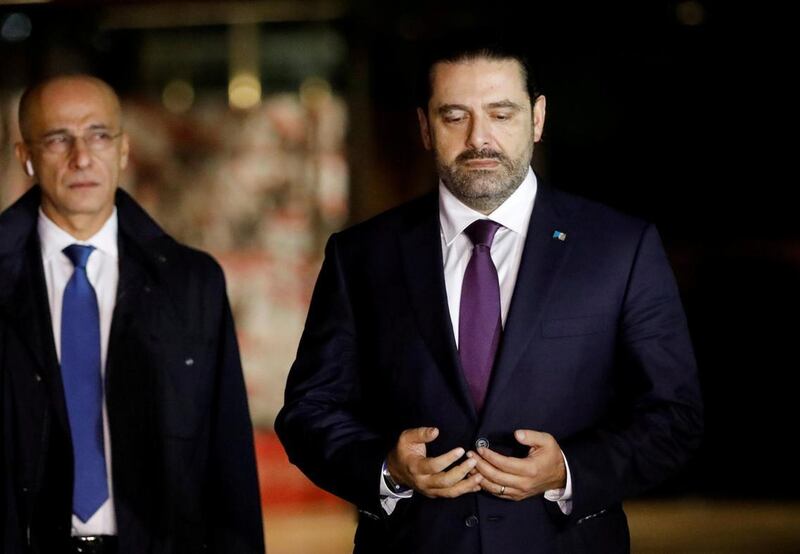After announcing his resignation three weeks ago as Lebanon's prime minister from the safety of Saudi Arabia, Saad Hariri returned home on Tuesday. The expectation was that Mr Hariri, who cited a threat to his life from Tehran and its proxies as the reason for his departure, would formally quit. Instead, he suspended his resignation at the urging of president Michel Aoun, calming, for the time being, the troubled waters being whorled into a frenzy that could tip what is already a politically fragile balance.
Mr Hariri's departure and unexpected U-turn have exposed the fractured realities of Lebanon, vulnerable to Hizbollah's bid to secure more influence and power and interference from its patron, the Iranian regime. They placed Mr Hariri in an increasingly difficult position while rendering governance all but impossible. Hizbollah, acting as a state within a state in Lebanon, ventured into Syria at the Iranian's regime instigation. Its mercenary services proved instrumental in securing the survival of president Bashar Al Assad, a man who, in addition to butchering hundreds of thousands of his own people, has a long and squalid history of brutalising Lebanon. Lest we forget, Mr Hariri's late father Rafik was allegedly felled by the same forces that threatened to kill him, a claim Hizbollah leader Hassan Nasrallah has repeatedly denied. But just as Mr Hariri said then that he would "not allow my father's blood to stir disunity in Lebanon", he is now compelled to pour oil on those troubled waters. On Twitter, he emphasised the importance of "distancing oneself from everything that hurts internal stability and fraternal relations with other Arab countries".
____________________
Read more
[ Lebanon PM Hariri says resignation on hold pending talks ]
[ Prince Turki: Iran has not apologised for attack on Saudi embassy ]
____________________
Lebanon cannot continue to be used as an arena for others' battles nor can it be used as a tipping point for regional conflict. It is untenable for Hizbollah to operate as a state within a state and use the country as a base for military forays into regional disputes it should be no part of. Nor can this week's dramatic turn of events be separated from the Iranian regime's conduct across the region. In Yemen, for instance, it has armed Houthi militias, who have launched dozens of Iranian-supplied missiles at Saudi Arabia. The nuclear deal with the Iranian regime has so far failed to deliver. As Prince Turki Al Faisal, Saudi Arabia's former chief of general intelligence, told The National in an exclusive interview this week, there has been "no improvement in Iran's behaviour since the signing of the deal".
Prince Turki's declaration that there can be "no room for negotiations" with Tehran in such a climate will find support in every nation that has been exposed to Iran's actions. As Lebanon struggles toward stability, Yemen slides ever deeper into chaos and Syrians continue to die at the hands of Mr Al Assad, it's concerning to contemplate how the Iranian regime, acting without restraint while the nuclear deal is operational, will behave when the deal lapses after its 15-year period. Countries in this region, Prince Turki warned, "need assurances" that the threat from Iran won't magnify in the future. Everyone with an interest in peace ought to heed him.
Follow The National's Opinion section on Twitter





